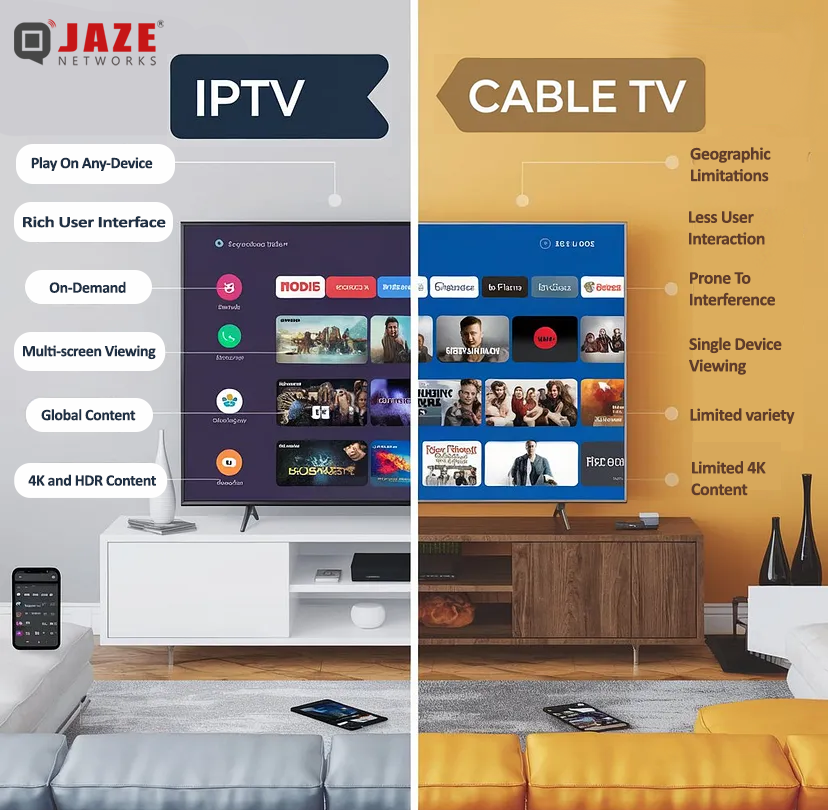
IPTV vs Cable: A Complete Comparison Guide for 2024
Nexott is the most stable IPTV I’ve used – no buffering even during live sports!
Estimated reading time: 12 minutes
Key Takeaways
- IPTV offers flexibility and features that traditional cable can’t match.
- Cable TV provides consistent service but lacks customization.
- Understanding your needs is crucial when choosing between IPTV and cable.
- IPTV is becoming more popular due to its cost-effectiveness and convenience.
- Reliable internet is essential for IPTV services.
Table of Contents
- Understanding IPTV
- Traditional TV Services Explained
- IPTV vs Cable: The Direct Comparison
- IPTV vs Satellite: Key Differences
- Cord Cutting Options Explored
- Benefits of IPTV
- Making Your Decision
- Conclusion
- Frequently Asked Questions
Understanding IPTV
Internet Protocol Television (IPTV) represents a modern approach to content delivery, streaming television programming through internet connections rather than traditional broadcast methods. Unlike conventional TV services, IPTV transforms your viewing experience with:
- Extensive on-demand content libraries
- Customizable channel packages
- Multi-device streaming capabilities
- Interactive features like pause and rewind
- Mobile viewing options
IPTV works by converting television signals into digital data packets, transmitted over high-speed internet connections. This technology enables features that traditional cable simply can’t match.
Traditional TV Services Explained
Cable Television
Cable TV relies on a physical infrastructure of coaxial or fiber-optic cables to deliver content to your home. Key characteristics include:
- Professional installation requirements
- Fixed channel bundles
- Location-dependent viewing
- Set-top box necessity
- Limited device compatibility
Satellite Television
Satellite TV broadcasts content via orbiting satellites to home-mounted dishes. Notable features include:
- Weather-dependent service
- Professional dish installation
- Clear line-of-sight requirement
- Limited mobility
- Fixed channel packages
IPTV vs Cable: The Direct Comparison
Content Delivery and Quality
IPTV:
- Streams over internet connections
- Quality depends on bandwidth
- Potential for 4K streaming
- Occasional buffering possible
Cable:
- Consistent signal through physical cables
- Standard HD quality
- Some 4K options
- Weather-resistant service
Pricing Structure
IPTV:
- Monthly costs: $15-$80
- No long-term contracts
- Flexible pricing options
- Lower equipment costs
Cable:
- Monthly costs: $50-$150
- Contract requirements
- Bundle pricing
- Equipment rental fees
Channel Selection and Customization
IPTV:
- Customizable packages
- A la carte channel selection
- International content options
- Extensive on-demand libraries
Cable:
- Predetermined bundles
- Limited customization
- Local channel focus
- Basic on-demand options
User Experience and Flexibility
IPTV:
- Multi-device streaming
- Advanced interactive features
- Mobile viewing capability
- Cloud DVR options
Cable:
- Fixed viewing locations
- Basic DVR features
- Limited device support
- Traditional interface
IPTV vs Satellite: Key Differences
Signal Reliability
IPTV:
- Weather-independent service
- Requires stable internet
- Consistent performance
Satellite:
- Weather-sensitive reception
- Clear sky requirement
- Signal interruption risks
Installation and Equipment
IPTV:
- Simple self-setup
- Minimal equipment needed
- Software-based system
Satellite:
- Professional installation
- Dish mounting required
- Multiple hardware components
Cord Cutting Options Explored
The cord-cutting movement continues to gain momentum as viewers seek alternatives to traditional TV services. Popular options include:
Streaming Services:
- Netflix, Hulu, Amazon Prime
- Content-specific platforms
- Original programming
Live TV Streaming:
- YouTube TV
- Sling TV
- Philo
IPTV Services:
- Comprehensive channel packages
- Live and on-demand content
- Flexible viewing options
Benefits of IPTV
Cost Efficiency:
- Lower monthly fees
- No hidden charges
- Equipment cost savings
- Flexible payment options
Enhanced Features:
- Interactive programming guide
- Cloud DVR capability
- Catch-up TV options
- Multi-screen viewing
Content Variety:
- Global channel access
- Extensive VOD libraries
- Premium content options
- Niche programming
Making Your Decision
Consider these factors when choosing between IPTV and traditional TV services:
Internet Quality:
- Connection speed
- Stability
- Data caps
- Provider options
Viewing Habits:
- Preferred content types
- Watching schedule
- Device preferences
- Mobile needs
Budget Considerations:
- Monthly cost tolerance
- Equipment investments
- Contract preferences
- Bundle requirements
Conclusion
The choice between IPTV and cable ultimately depends on your specific needs and circumstances. IPTV offers superior flexibility, customization, and cost-effectiveness but requires reliable internet. Cable provides consistent service and simplicity but at a higher cost with less flexibility.
For most modern viewers, IPTV represents the future of television consumption, offering an impressive balance of features, convenience, and value. However, traditional cable might still be preferable for those prioritizing reliability over flexibility or living in areas with limited internet infrastructure.
Frequently Asked Questions
What is IPTV?
IPTV stands for Internet Protocol Television. It delivers television programming through internet connections rather than traditional broadcast methods, offering greater flexibility and customization.
How does IPTV differ from cable?
IPTV uses the internet to stream content, allowing for on-demand viewing, customizable packages, and multi-device compatibility. Cable relies on physical cables and offers fixed channel bundles with less flexibility.
Do I need special equipment for IPTV?
Generally, you’ll need a compatible device such as a smart TV, computer, or streaming device with internet access. Some services may require a set-top box or app installation.
Is IPTV more cost-effective than cable?
IPTV often has lower monthly fees, flexible pricing options, and minimal equipment costs compared to traditional cable services, making it a more cost-effective choice for many users.
What are the internet requirements for IPTV?
A stable, high-speed internet connection is essential for IPTV to ensure smooth streaming without buffering. Check with your provider for specific speed recommendations.
